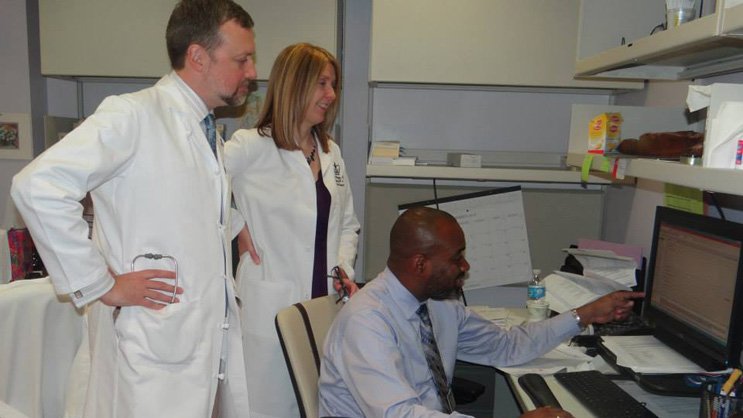Clinical Coordinator at the Pancreas Center
The NewYork-Presbyterian/Columbia Pancreas Center cares for patients with various diseases of the pancreas including pancreatic cancer, pre-cancerous conditions, and pancreatitis. As a Physicians Assistant, Patrick Coty's role is to support and assist the surgeon to evaluate and treat patients with pancreatic diseases. He evaluates patients during their initial visit to the center, during which he obtains each patient's medical history, family history of cancer, and medication list. He performs a physical examination and reviews all prior test results including imaging studies, biopsies, and tumor markers. He then presents each patient to the surgeon, and together they formulate a plan of care.
If a patient undergoes surgery, PA Coty provides comprehensive education and completes the preoperative clearance requirements. He assists the surgeon during the first post-operative follow-up visit by removing surgical staples and drains, and he makes sure the surgical wound is healing well. The surgeon then reviews the pathology report and discusses plan of care with patients. During this visit, he also answers the many questions his patients ask him.
 In the following interview, PA Coty shares some of the most common questions he addresses every day.
In the following interview, PA Coty shares some of the most common questions he addresses every day.
Will I need surgery?
Patients come to the Pancreas Center to determine whether they are a surgical candidate and to discuss what options are available. After the initial visit, each patient is discussed at the weekly pancreas conference by a multidisciplinary team composed of surgeons, radiologists, oncologists, gastroenterologists and mid-level providers including nurse practitioners, physician assistants, and registered nurses. During that meeting, the team decides the best plan of care for the patient. At the end of the meeting, we (NP, PA, and RN) contact every patient to discuss the group's consensus plan. The surgeons contacts patients as well, especially if the group decides the patient is not a surgical candidate because of the extent of their disease. At that time, patients are referred to our medical oncology experts.
Will I need chemotherapy?
Chemotherapy can be initiated before or after pancreas surgery. Sometimes chemotherapy and radiation are used to shrink a tumor or if there is blood vessel involvement in order to make a tumor operable. We offer new procedures and techniques, including clinic trials of aggressive chemotherapy and radiation, which are not available at most other centers. This approach allows us to surgically remove pancreatic tumors that many other centers would consider inoperable. Many patients also undergo chemotherapy after surgery in order to eliminate any residual cancer cells.
Will I become diabetic, or if I am already diabetic, will my diabetes get worse?
Diabetes is one of the most common post-surgical complications of pancreas surgery as most patients lost their ability to produce insulin to regulate their glucose level. If you already have diabetes, it will become more difficult to maintain normal glucose levels. Patients need to be monitored very closely by their endocrinologist to prevent complications of uncontrolled diabetes as well as hypoglycemia, as their appetite drastically decreases with very minimal food intake after pancreas surgery. About 10% of patients will develop diabetes following surgery. Patient education is very important during initial evaluations, at which time the team reviews in detail what to expect as well as post-operative complications. It takes a dynamic team effort to care for patients after pancreas surgery.
What is my prognosis? How long will I live?
This is a very common question since pancreas cancer is known as a silent killer. Many factors affect the prognosis for pancreas cancer: predicting factors include the extent of the tumor, blood vessel involvement, the presence of metastatic disease, and response to chemotherapy and radiation therapy. It takes a team approach to address all the patients' medical, emotional and spiritual needs to help them face the challenge of managing pancreas cancer. Our goal is to provide the best medical care to our patients and provide support to their family and loved ones as well.
What can I eat? How can I maintain my weight?
Most patients experience delayed gastric emptying after pancreas surgery, and many experience low appetite, nausea, vomiting, and diarrhea, which may also worsen during chemotherapy. Rapid weight loss may occur because they are not absorbing nutrients well, and patients may require replacement enzymes if their pancreas has been removed. Our nutritionist plays a great role in counseling and providing in-depth education, recipes, and ongoing guidance about nutrition in order to help patients remain as strong as possible.
When can I return to normal daily activities?
This is always an individual matter, as every person's situation is different. In general we advise patients that they should not engage in strenuous exercises or lift heavy objects for three months after surgery, in order to prevent incisional hernia formation and to make sure their surgical wound is completely healed. If there are no complications, patients usually return to work six to eight weeks after surgery.
Will I be cancer-free after surgery?
Again, every person's case is unique. The primary goal of surgery is to remove the tumor completely. The pathology reports provide final confirmation regarding extent of the disease, lymph node margins, and other organ involvement. We also recommend scheduled follow-up scans after surgery to check for recurrence of disease.
I have been told my tumor is inoperable because of involvement with blood vessels. Is this something you can treat at the Pancreas Center?
It may be possible, yes. This group of patients receives aggressive chemotherapy with or without radiation with the goal of shrinking the tumor. Our surgeons use NanoKnife® technology, a minimally invasive treatment that uses electric current to target and destroy tumors that are entangled with blood vessels, allowing us to free the vein from the tumor tissue and safely remove the tumor. Our surgeons are able to remove many tumors that are considered inoperable at other centers.
Are my children or siblings at risk for pancreatic cancer?
During the initial evaluation, I take an extended history that includes documentation of not only pancreatic cancer in the family, but all forms of cancer, because certain cancers and cancer syndromes are associated with an increased risk of pancreatic cancer. Our genetic team reviews this history further and may recommend genetic testing for the patient's children, siblings, or other family members. Screening at early stages is very important for anyone who may have an increased risk of pancreatic cancer.

